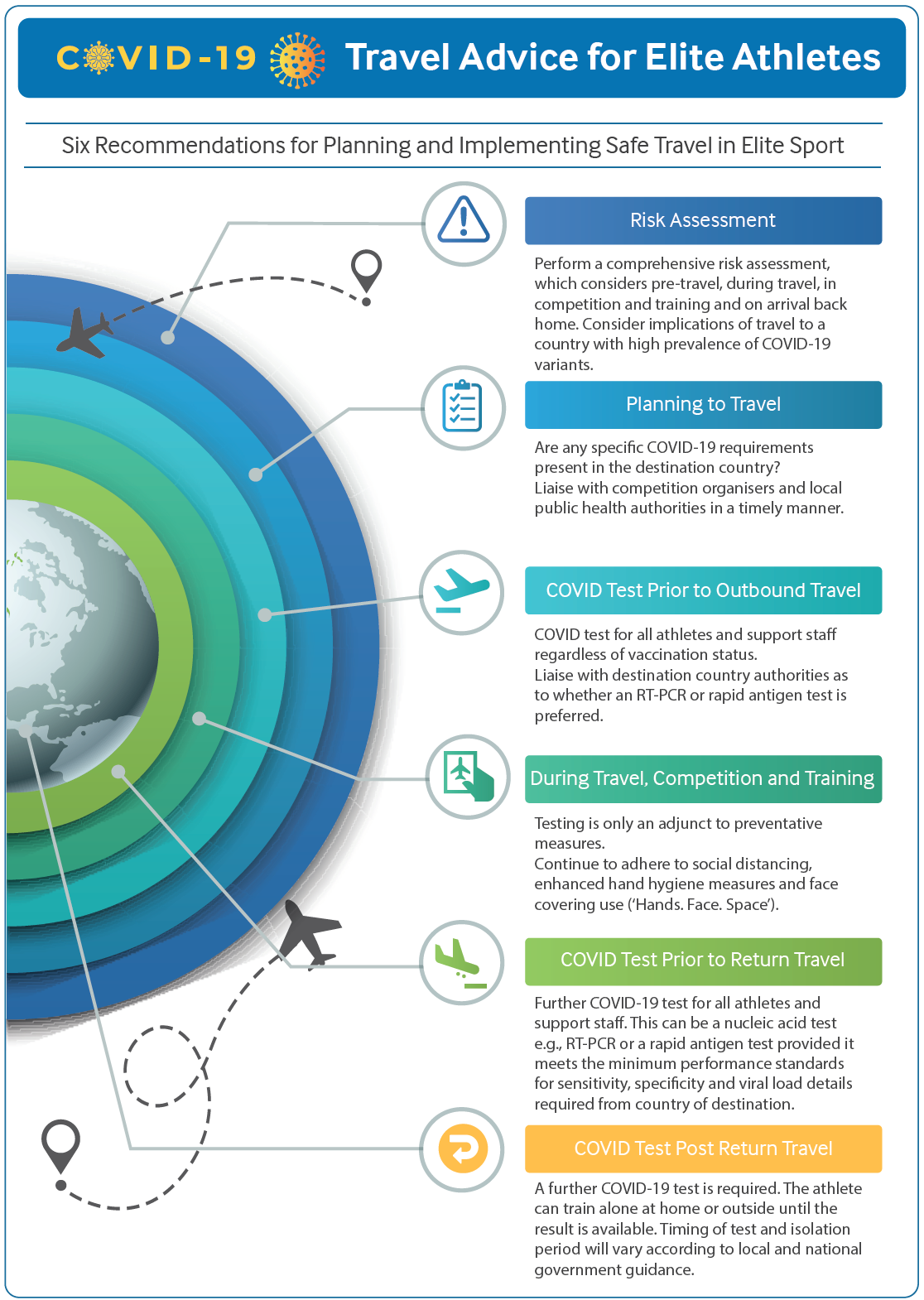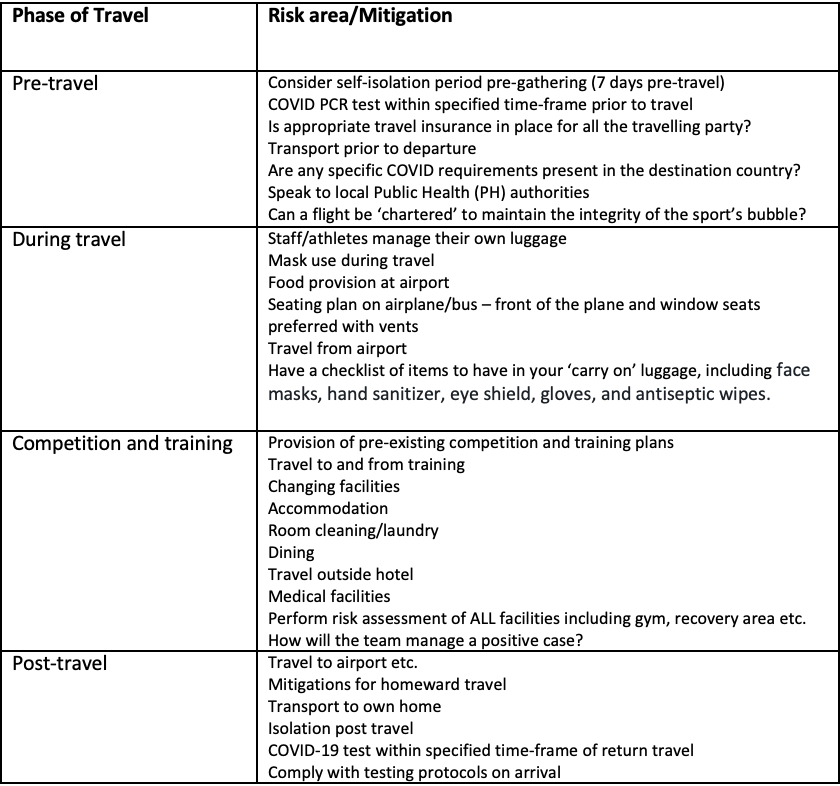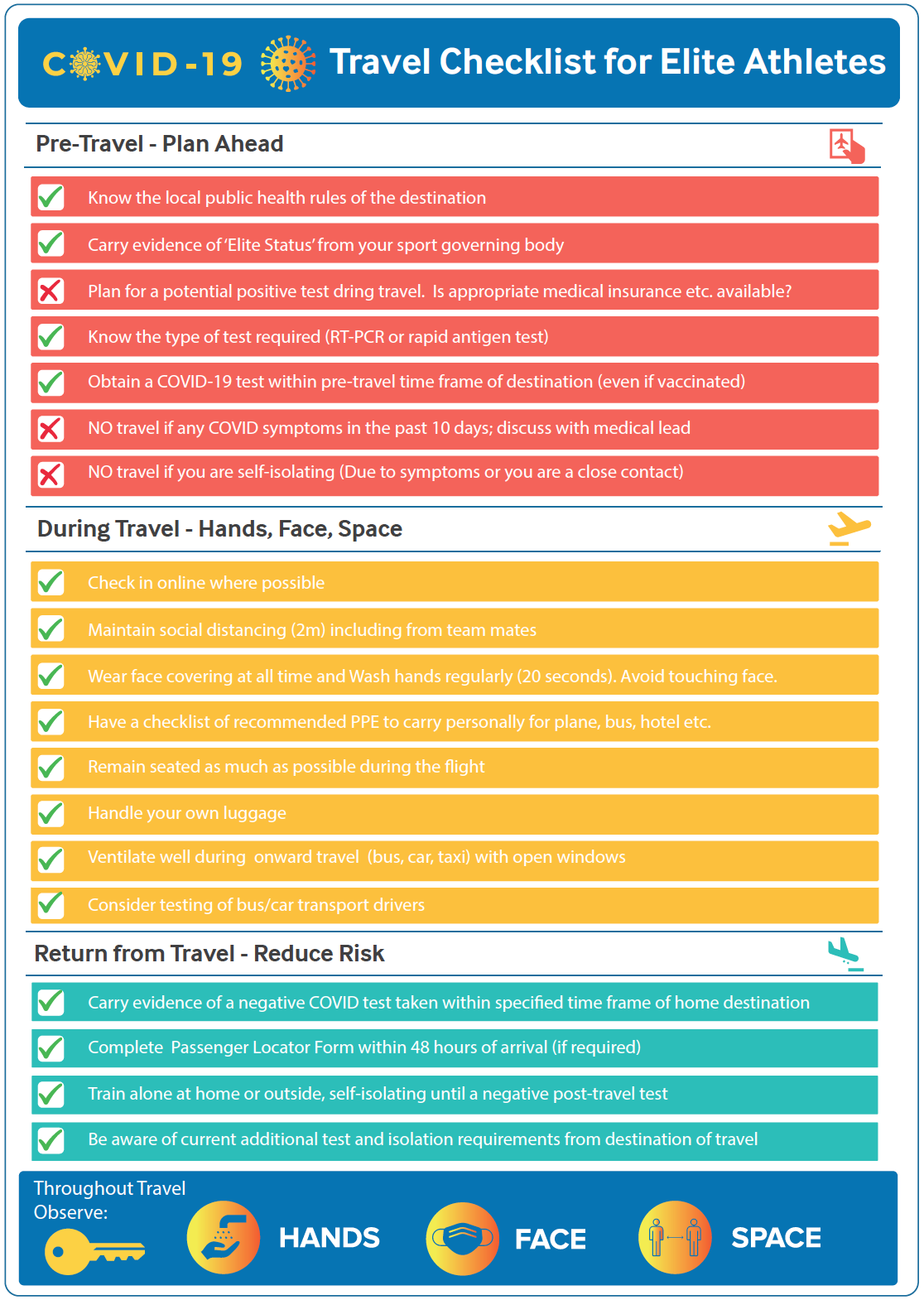This graphical guide outlines current evidence-based recommendations on travelling in elite sport during the coronavirus pandemic. This serves only as a guide; given the dynamically changing situation, any newly released recommendations should be taken into account.

General Travel Guidance – key considerations:
At the time of writing (March 2021) travel is generally only recommended for essential purposes.
Travel into countries, generally requires proof of a negative COVID-19 test, e.g. in the UK within 72 hours, prior to arrival and these rules also apply to elite sport.
Be aware of countries that require athletes to quarantine in a government-approved facilities (i.e. managed quarantine) for a certain period of time, e.g. 14 days in Australia, including those with elite sport status, and the impact that such a quarantine period could have on the athletic preparations for that individual(s).
Elite Sport Exemption:
Elite sports participation, as recognised through the Sports’ Governing Body, has been permitted as a reason to avoid quarantine restrictions that apply to the general public in some countries and some governments have produced specific guidance around elite sport. In order to qualify for elite sport exemption, a risk assessment and mitigation strategy that meet such requirements must be in place. The UK information can be found at the following link:
The accompanying COVID-19 Travel Checklists for Elite Athletes and Sports Governing bodies (Figure 1 and Figure 2 respectively) can provide a framework to facilitate safe international/cross-border travel, whilst minimising the COVID-19 health risk to the travelling party, but fulfilling Government travel requirements.
Testing Considerations:
We outline the minimum recommended level of testing. Based on a risk assessment, considering factors such as duration of travel and exposure to additional sporting bubbles, in addition to competition and international requirements, additional testing beyond those in this article may be required.
Reverse Transcriptase Polymerase chain reaction test for SARS COV-2 (RT-PCR) offers the highest sensitivity and specificity. While rapid antigen tests can be used to support the testing process, RT-PCR testing should be used where possible, and rapid tests are not recommended for travel from regions with significant prevalence of new COVID-19 variants.
Test 1 – Prior to outbound travel, e.g. within 72 hours of travel to the UK or 48 hours into the USA, regardless of vaccination status. It will depend on the host country as to the type of test required so ensure you check the current requirements.
Test 2 – On return travel, obtain the appropriate COVID-19 test for the destination country within the timeframe required by the destination country.
Ensure both test 1 and 2 meet the minimum standards for sensitivity, specificity and viral load and a list of approved tests for the UK is available at – Coronavirus (COVID-19): testing for people travelling to England – GOV.UK (www.gov.uk).
Test 3 – Consider post-travel, either an RT-PCR or rapid antigen, test e.g. on Day 5. The athlete must self-isolate until the result is available.
Ensure that you check with the destination and home countries if a managed quarantined period is required. For example, in the UK, two RT-PCR tests on day 2 and day 8 of a 10-day quarantine period are required when returning from an ‘amber’ country. No outdoor activity is permitted in those 10 days.
Additionally, pre-travel, in those sports with a roster of athletes to select from and upcoming competitions, consider a test 7-10 days prior to travel in case a positive result arises and a back up athlete needs to be called up and tested in accordance with the protocols.Travel Risk Assessment (see Supplementary material):
This should be comprehensive and address the following points:


Conclusion:
This guidance, together with the accompanying checklists, aims to support those involved in elite sport to undertake cross-border/international travel for the purposes of training and competition. It raises awareness of key considerations that need to be taken into account during the COVID-19 pandemic. This document is likely to evolve with time as government guidance changes and does not constitute legal advice or replace official government or Public Health advice and we appreciate that testing protocols for vaccinated individuals may change.
We hope to further collaborate with our international colleagues, particularly in the build up to the Tokyo Olympics 2021, to further develop an internationally agreed consensus for world-wide travel in the context of COVID-19 for elite sport.
Authors And Affiliations: Izquierdo, D1; Rankin, A2; Martin, R3; Biswas, A4; Elliott, N5; Chiampas, G6,7; Heron, N2,8,9.
- Medical and Scientific Department, European Tour Golf. Various. Virginia Water. UK. GU25 4LX
- Sports Institute Northern Ireland, Sports Medicine
- Welsh Institute of Sport, Sport Wales, Cardiff, Wales.
- English Institute of Sport, Bisham Abbey National Sports Centre, England.
- Scottish Institute of Sport, Stirling, Scotland.
- Departments of Emergency Medicine and Orthopaedic Surgery, Northwestern University, USA.
- Chief Medical Officer, United States Soccer Federation, USA.
- Centre for Public Health, Queen’s University of Belfast, Northern Ireland
- Department of General Practice, Keele University, England
Corresponding author: Dr N Heron, N.Heron@qub.ac.uk
Competing interests – Nil
Acknowledgements – We would like to thank Dr Rod Jacques, Medical Director, English Institute of Sport, for his collaboration on this project. We would also like to thank Dr Jonathan T. Finnoff (Chief Medical Officer, United States Olympic and Paralympic Committee and Professor, Department of Physical Medicine and Rehabilitation, Mayo Clinic College of Medicine and Science, Rochester, MN) for his advice and support on this infographic.
References:
Elite Sport Stage 4 – Return to Cross Border Competition https://www.gov.uk/government/publications/coronavirus-covid-19-guidance-on-phased-return-of-sport-and-recreation/elite-sport-return-to-cross-border-competition-guidance
Coronavirus (COVID-19): guidance on the phased return of elite sport
https://www.gov.uk/government/publications/coronavirus-covid-19-guidance-on-phased-return-of-sport-and-recreation
Entering the UK Guidance https://www.gov.uk/uk-border-control/self-isolating-when-you-arrive